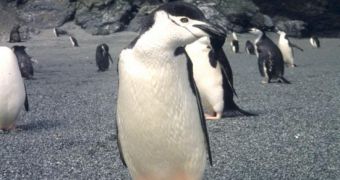Evolutionary biologists looking into the evolutionary rates and patterns of Adelie penguins have recently determined that the animals appear to be evolving at a much faster pace than previously calculated. In the research, scientists looked at mitochondrial DNA samples collected from penguins currently living in rookeries in Antarctica, as well as from penguins that lived in the same locations over 44,000 years ago.
Comparisons allowed the team to put together a rough map of how the animals' molecular evolution took place. Results indicated that the Adelie penguins were evolving at a pace that was two to six times faster than originally calculated, Wired reports. Details of the amazing, new research appear in the November issue of the scientific journal Trends in Genetics. The Oregon State University-based science group explains in the paper that mitochondria are organelles that were stand-alone bacteria in the early days, but that became integrated in more complex organisms later on, and started acting like cellular power plants.
Because of the massively important role that mitochondria play inside the cells, mutations and evolutionary traits do not catch on quick inside the organelles. Any false move, and the entire energy-production process is destroyed, which inevitably leads to the cells' death. The number of changes in mitochondrial DNA can therefore be used to determine the rate of molecular evolution in an organism. The cross-analysis of related species can tell researchers when the last common ancestor of the two species lived, and what main traits it had. The new study essentially proves that the rate of evolution is not the same across all species, which has been the main idea in the scientific community until now.
In the investigation, the researchers analyzed data from 12 modern-day penguins, as well as the genetic material of eight ancient Adelie penguins, aged between 250 and 44,000 years old. OSU evolutionary geneticist Dee Denver says that the study revealed a highly accelerated pace of evolution, when compared to the predictions that other scientific methods produced. The coauthor of the new paper also adds that more changes may in fact have taken place. The team counted each DNA difference between the penguins as being stand-alone, when, in fact, it may have been the product of several changes happening at the same time.

 14 DAY TRIAL //
14 DAY TRIAL //